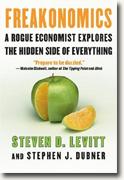Steven D. Levitt & Stephen J. Dubner
book reviews:
· general fiction
· chick lit/romance
· sci-fi/fantasy
· graphic novels
· nonfiction
· audio books
· author interviews
· children's books @
curledupkids.com
· DVD reviews @
curledupdvd.com
newsletter
win books
buy online
links
home
for authors
& publishers
for reviewers

 |
Freakonomics: A Rogue Economist Explores the Hidden Side of Everything Steven D. Levitt & Stephen J. Dubner William Morrow Hardcover 256 pages May 2005 |
|
I have to state, right off the bat, that I’m not one to read economic books. But there was something catchy in the name Freakonomics that made me pick this one up. I think I can attribute it to "freak" being in the title. It made me think, “Is this the way freaks spend money? No, it’s not that. What it is is atypical economist Steven D. Levitt’s and co-author Stephen J. Dubner’s exploration of what they call the hidden side of everything.
The first forty pages or so are kind of bland (I was half expecting that from an economics book) and redundant in the fact that I didn’t particularly find it to be a revelation that a real estate agent will work harder to sell his own house than yours. Nor did I find all the stats on cheating all that amazing. This part was kind of obvious. When there are financial incentives people will cheat – DUH! But after this part, the book starts cooking, and there are some bits of humor and tragedy when you come to learn the fate of Levitt’s first son, Andrew. They pose many freakish questions like: Why do drug dealers live with their moms? What does crack cocaine have in common with nylon stockings? What do schoolteachers have in common with sumo wrestlers? And how is the Klan like a group of real estate agents? They answer them, though there is no real theme they are conveying other than morality and economics mesh between the real world and unmasking the fake world. They also go on to explain how the reduction in crime had nothing to do with new police strategies and more with Roe v. Wade and that crack gangs are analogous to the way McDonald’s and Wal-Mart are run. This all makes for interesting reading and some funny (albeit awkward, if not outright dangerous) moments. In particular, on page 95, the way sociologist Sudhir Venkatesh learns to modify his multiple-choice survey that he used to question inner-city black youth in Chicago is quite blunt. Also, on page 190 where they discuss the effects of black-sounding and white-sounding names, they have examples of someone who named their kids OrangeJello and LemonJello that was further dignified with the pronunciations a-RON-zhello and le-MON-zhello. Topping that was the example previous where… well, let’s just say the name was spelled to read like – excrement cranium! Use your imagination and you’ll chuckle, too. Overall, the conversational prose keeps the book chugging along at a good pace, and though some professional economist might be able to tear these theories to shreds, the layman will be able to follow and enjoy. © 2005 by Bobby Blades for curledup.com. |
|
|
|
 Click here to learn more about this month's sponsor! |
|
| fiction · sf/f · comic books · nonfiction · audio newsletter · free book contest · buy books online review index · links · · authors & publishers reviewers |
|
| site by ELBO Computing Resources, Inc. | |
 At the root, they believe that economics is simply a matter of incentives – how people get what they want, or need, especially when other people want or need the same thing. This theory I agreed with, and it was explored through out the book with many examples.
At the root, they believe that economics is simply a matter of incentives – how people get what they want, or need, especially when other people want or need the same thing. This theory I agreed with, and it was explored through out the book with many examples.